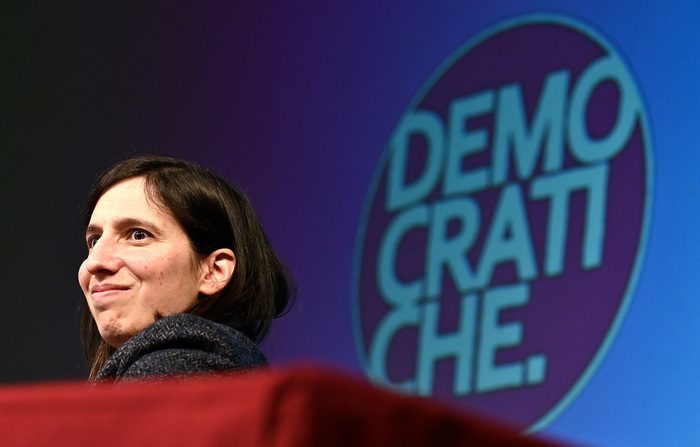Enlarge image
ECB headquarters in Frankfurt am Main: Benefits for the banks
Photo: Andreas Arnold / dpa
The picture of the past few days is that of an upside-down world: on the one hand, the economy is reeling towards a recession.
High energy prices, delivery problems, falling demand and the like are leaving their mark and are bringing more and more companies to their knees.
Numerous private households are also feeling the effects of the crisis and fear that they will no longer be able to pay their bills.
On the other hand, and as if nothing had happened, the stocks of banks fired off a small but fine price firework.
Deutsche Bank and Co. gained more than ten percent on the stock exchange within a few days.
Of course, the interest rate hike by the European Central Bank (ECB) played a role in this, although this was expected and should therefore have been largely priced into the prices.
However, another detail of monetary policy that is relatively unknown to the general public is likely to play at least as important a role: the ECB is providing the banks with a subsidy of up to 40 billion euros.
Experts had actually expected that the ECB would finally do something about these free profits, after all, this development had been foreseeable for months.
So far, however, the central bank has only announced that it is discussing this problem.
Unpowered excess gains
What is the background of these unperforming excess profits for banks?
It's about an ominous lending program called Targeted Long Term Refinancing Operations III (TLTRO III).
This support program allowed banks to borrow central bank money cheaply from 2019 to the end of June 2022.
As part of TLTRO III, the ECB offered loans with negative interest rates of up to half a percent below the base rate.
This should stimulate lending.
The only requirement was that the credit institutions had to at least keep their lending constant.
For example, the program was never about the loans granted being used for sustainable projects.
In view of a negative key interest rate, the banks were given money relatively easily.
A year later, for example, only 4,950,000 euros of a five million euro loan from the ECB had to be repaid.
That alone caused a legitimate debate.
Of course, many banks were happy about “the government grant” and participated in it.
They used loans of 2.2 trillion euros.
Due to the turnaround in interest rates, from which many financial institutions are benefiting massively anyway, the profits from TLTRO III are now going through the roof.
The ECB makes policy here for the credit institutions.
The subsidies, which are actually intended for periods of low interest rates, enable banks to make massive profits from the crisis.
Because the favorable conditions of sometimes minus one percent, at which the banks procured the money from the ECB, are fixed.
The loans do not have to be repaid until later and some run until the end of 2024. The institutes, in turn, can now invest the money with the central bank with significantly better interest and thus make double the profits – once through the negative interest on loans and once through the interest from the investment.
The higher interest rates rise, the more the banks benefit.
Banks can distribute profits to managers and shareholders
This is why banks are also making massive excess profits in this crisis.
And just like with energy companies, these extra profits should be skimmed off.
Of course, the ECB could, for example, simply pay less interest on the banks' excess money, so that the banks cannot make huge extra profits.
But despite months of discussion, she apparently decided not to do so.
It has not even set tougher conditions for profiteers, such as a ban on profit distributions, so that excess profits remain in the banks and equity is strengthened.
There is therefore a risk that, against the background of excess profits, generous bonuses will be paid out to board members or dividends to shareholders,
That's why politics is needed now.
Because these excess profits of the banks are at the expense of central bank profits - and thus ultimately also at the expense of the citizens, because at least some of the ECB's profits flow via the national central banks to the respective state budgets in the euro zone.
The excess profits given away by the banks mean that the German state budget is less well equipped and therefore possibly less crisis aid, for example for low-income earners.
Given Germany's share of the eurozone, it could be in the tens of billions.
This would help many people in this crisis.
The President of the Savings Bank, Helmut Schleweis, recently warned that soon more than half of the population would no longer be able to get by on their monthly income.
Many companies and consumers are worried about their economic future and the big question is to what extent the state can provide financial aid.
At such a time, these excess profits of the banks cannot be ignored.
Even without these subsidies, financial institutions are already benefiting from the current policies of the central bank and many governments.
Many financial institutions are happy about the rising interest rates.
They are also benefiting from all the government bailouts, as this allows more households and businesses to remain solvent and service loans that might otherwise have defaulted.
There is therefore no justification for further gifts to the banks.
If the ECB does not immediately intervene to correct itself and prevent the banks from generating idle income at the expense of taxpayers, the federal government should intervene and skim off the excess profits.








/cloudfront-eu-central-1.images.arcpublishing.com/prisa/C3LDLHDAXBBCFCHWBPELHN64FU.jpg)
